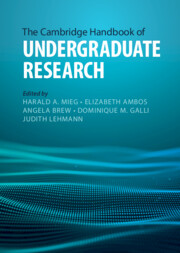Book contents
- The Cambridge Handbook of Undergraduate Research
- The Cambridge Handbook of Undergraduate Research
- Copyright page
- Contents
- Figures
- Tables
- Contributors
- Foreword
- Foreword
- 1 Introduction
- Part I Theory and Research on Undergraduate Research
- Part II Implementation, Approaches, Methods
- Part III Disciplines
- 17 Introduction
- Part III.1 STEM
- Part III.2 Health
- Part III.3 Social Sciences
- Part III.4 Humanities
- Part III.5 Arts & Design
- Part III.6 Disciplines A–Z
- 40 Undergraduate Research in Business Schools
- 41 Undergraduate Research in Early Childhood Education
- 42 Undergraduate Research in Geography
- 43 Undergraduate Research in Legal Studies
- 44 Undergraduate Research in Social Work Education
- 45 Approaches to Undergraduate Research in Sustainability
- 46 Undergraduate Research in Teacher Education
- Part IV International Perspective
- Part V Avenues for Developing Undergraduate Research
- Index
- References
44 - Undergraduate Research in Social Work Education
Challenges and Possibilities
from Part III.6 - Disciplines A–Z
Published online by Cambridge University Press: 11 August 2022
- The Cambridge Handbook of Undergraduate Research
- The Cambridge Handbook of Undergraduate Research
- Copyright page
- Contents
- Figures
- Tables
- Contributors
- Foreword
- Foreword
- 1 Introduction
- Part I Theory and Research on Undergraduate Research
- Part II Implementation, Approaches, Methods
- Part III Disciplines
- 17 Introduction
- Part III.1 STEM
- Part III.2 Health
- Part III.3 Social Sciences
- Part III.4 Humanities
- Part III.5 Arts & Design
- Part III.6 Disciplines A–Z
- 40 Undergraduate Research in Business Schools
- 41 Undergraduate Research in Early Childhood Education
- 42 Undergraduate Research in Geography
- 43 Undergraduate Research in Legal Studies
- 44 Undergraduate Research in Social Work Education
- 45 Approaches to Undergraduate Research in Sustainability
- 46 Undergraduate Research in Teacher Education
- Part IV International Perspective
- Part V Avenues for Developing Undergraduate Research
- Index
- References
Summary
Undergraduate research education is increasingly important for social work practitioners given the demands for evidence-based practice in social service delivery. Increasingly research competency or new knowledge integration into practice has been identified as a professional responsibility. However, social workers eill often not use or engage in research in their practice settings, tasking social work educators to address this gap through developing innovative undergraduate curricula through which student learners can be engaged. This chapter examines the literature in this area and identifies several proposed engagement strategies such as incorporating research tasks directly into coursework, creating research assistant positions or internships, developing partnerships with community-based agencies to provide applied research opportunities or through case study scenarios and guest speakers, and using ‘real’ research datasets for qualitative/quantitative training. Building mentorship opportunities through research teams including undergraduate and graduate students to facilitate both teaching and learning opportunities in research may also be of benefit.
Keywords
- Type
- Chapter
- Information
- The Cambridge Handbook of Undergraduate Research , pp. 414 - 422Publisher: Cambridge University PressPrint publication year: 2022

